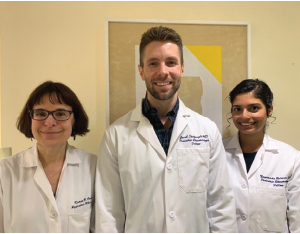A 17-year-old girl presents to the pediatric rheumatology clinic for follow-up of recently diagnosed systemic lupus erythematosus (SLE) characterized by class IV lupus nephritis, photosensitive rash and antiphospholid antibody positivity. She is currently being treated with prednisone, mycophenolate mofetil, and hydroxychloroquine. She is accompanied by her mother, who has been very involved in the patient’s care.
As part of routine adolescent assessment, the patient’s mother is asked to leave the exam room so a confidential psychosocial assessment can be performed using the HEADSS (home, education/employment, activities, drugs, sexuality, suicide/depression) framework.
During questioning, a sexual history is collected, and the patient is asked about her sexual orientation, sexual activity, contraception use, gender identity and preferred pronouns. The patient discloses that she is attracted to boys, is not currently sexually active and is not on hormonal contraception. She identifies as a girl and prefers the pronouns she/her.
The mother is brought back into the exam room, and the visit is concluded thereafter.
Several hours later, the rheumatologist receives a message from the front desk staff that the patient’s mother called and expressed anger about the questions her daughter was asked while she was out of the room. She feels it was inappropriate and unprofessional for the rheumatologist to ask her daughter about her sexuality and gender identity during a visit for her lupus.
Did the rheumatologist cross a line?
Talking to Teens

From left: Drs. Onel, Spitznagle and Balmuri
Adolescence is a common time for many rheumatologic diagnoses to first present. Apart from their medical conditions, teens often struggle with a host of psychosocial stressors involving mental health, substance use and sexuality. Physicians are afforded a unique opportunity to build relationships with their adolescent patients and help them navigate this challenging period of life.
The American Academy of Pediatrics, through its Bright Futures initiative, recommends psychosocial screening of adolescent patients at least annually.1 However, it has been estimated that up to one-third of insured adolescents have not had a single preventive care visit between the ages of 13 and 17.2 Therefore a visit to the rheumatology clinic is an opportunity to build trusting relationships and discuss sensitive psychosocial topics.
The HEADSS assessment for conducting a psychosocial interview was first published in Contemporary Pediatrics in 1988 by John Goldenring, MD, MPH, JD, and Eric Cohen, MD, who refined a framework originally developed by Harvey Berman, MD, in 1972.3 It has undergone multiple iterations over the past several decades, but serves to facilitate a conversation between the provider and the patient in a confidential manner.
Although many of the HEADSS components, including mental health, substance use and sexual activity, have clear impacts on our rheumatology treatment strategies and medical decision making, other components, such as sexual orientation and gender identity, may have less obvious relevance.
This raises the question, should the rheumatologist even be asking these questions? Is this the appropriate setting?
LGBTQ Vulnerability
Lesbian, gay, bisexual, transgender and questioning/queer (LGBTQ) spectrum youth, in particular those who are transgender and gender diverse, are a particularly vulnerable population, with high rates of depression, anxiety, eating disorders, self-harm and suicide. LGBTQ youth experience greater rates of homelessness, making up 20–40% of the more than 1.6 million homeless youth in the U.S. Once homeless, they are at increased risk of physical abuse or assault, mental health issues and substance use than are those who do not identify as members of sexual or gender minority groups.4
When we, as physicians, know poor outcomes exist in a group of patients, is it not part of our jurisdiction to assess our patients’ specific risks?
Lack of Access to Care
According to the 2015 U.S. transgender survey, one-third of transgender and gender nonconforming survey participants reported having had at least one negative experience with a healthcare provider in the past year, including being verbally harassed, refused treatment because of gender identity or having to teach their medical providers about transgender care.5
Gender nonconforming youth who don’t have access to quality healthcare can resort to self-treatment by purchasing illicit parenteral and enteral growth hormones, estrogens and androgens, allowing for inappropriate doses of medications that are not properly regulated.4 Self-administration puts these patients at particular risk for dire consequences from an infectious disease, as well as from a general health standpoint.
More specific to rheumatology, these hormones have been shown to intensify immune responses; therefore, inappropriate doses of these medications that are not being overseen by a physician may have increased consequences, such as exacerbating systemic autoimmune or inflammatory diseases.6
In the case of the 17-year-old SLE patient with nephritis and antiphospholipid antibody positivity, it’s important to assess her contraception use, her risk for pregnancy and any potential exposures she may have to exogenous hormones given concerns for worsening a lupus flare and increasing her clotting risk.
Strategies to Overcome Barriers
As adult and pediatric rheumatologists, we have the opportunity to develop long-term, trusting relationships with our patients. Thus, we may be the first providers patients feel comfortable disclosing their gender-diverse status to, or asking questions regarding sexual health or orientation of, and we can be a reliable source of validation, support and reassurance.
We believe use of the HEADSS assessment, including sexual orientation and gender identity-related questions, can help normalize conversations with patients to then allow us to offer more patient-specific and holistic treatment modalities for their rheumatologic illness and help us establish an open dialogue regarding issues that may affect their overall well-being.
Nayimisha Balmuri, MD, is a second-year fellow in pediatric rheumatology at the Hospital for Special Surgery, New York City. She has completed a fellowship in medical ethics/hospice and palliative medicine.
Jacob Spitznagle, MD, is a second-year fellow in pediatric rheumatology at the Hospital for Special Surgery, New York City.
Karen B. Onel, MD, is division chief of pediatric rheumatology at the Hospital for Special Surgery and professor of clinical pediatrics at Weill Cornell Medicine, New York City. She is chair of the ACR’s Committee on Ethics and Conflict of Interest.
References
- Bright Futures/American Academy of Pediatrics. Recommendations for preventive pediatric health care (Periodicity Schedule). 2019 Oct.
- Nordin JD, Solberg LI, Parker ED. Adolescent primary care visit patterns. Ann Fam Med. 2010 Nov–Dec;8(6):511–516.
- Goldenring JM, Cohen E. Getting into adolescent heads. Contemp Pediatr. 1988 Jul;5:75–90.
- Kimberly LL, McBride Folkers K, Friesen P, et al. Ethical issues in gender-affirming care for youth. Pediatrics. 2018 Dec;142(6):e20181537.
- James SE, Herman JL, Rankin S, Keisling M, Mottet L, Anafi M. The report of the 2015 U.S. transgender survey. Washington, D.C.: National Center for Transgender Equality. 2016.
- Buyon JP, Petri MA, Kim MY, et al. The effect of combined estrogen and progesterone hormone replacement therapy on disease activity in systemic lupus erythematosus: A randomized trial. Ann Intern Med. 2005 Jun 21;142(12 Pt 1):953–962.



